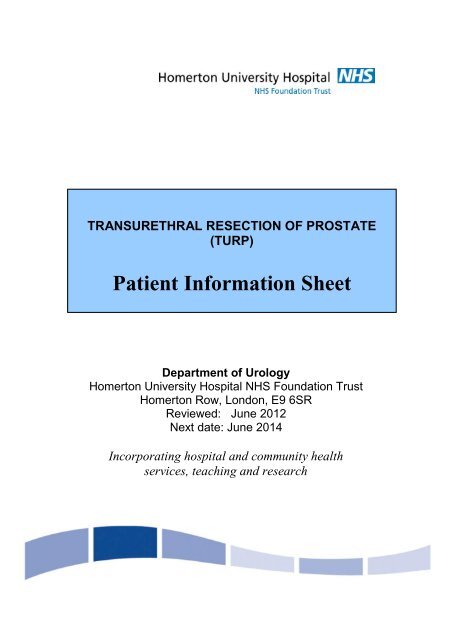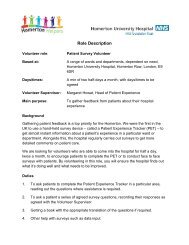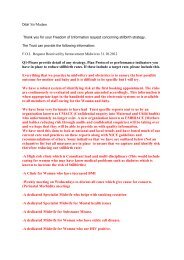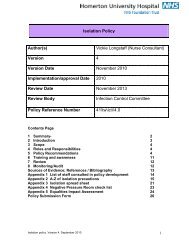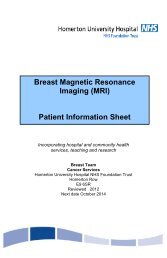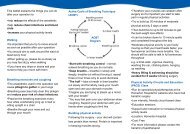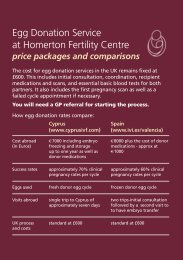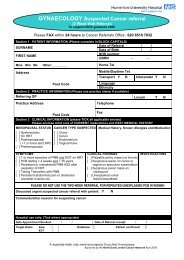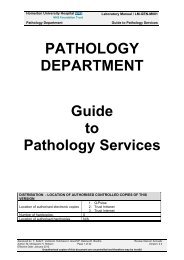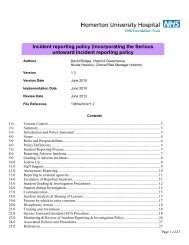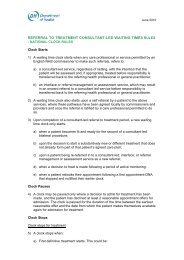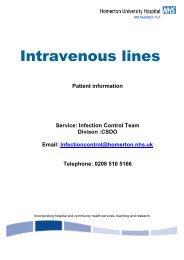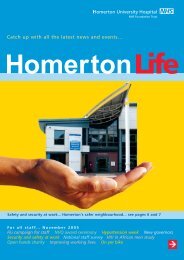TURP - Homerton University Hospital
TURP - Homerton University Hospital
TURP - Homerton University Hospital
You also want an ePaper? Increase the reach of your titles
YUMPU automatically turns print PDFs into web optimized ePapers that Google loves.
TRANSURETHRAL RESECTION OF PROSTATE<br />
(<strong>TURP</strong>)<br />
Patient Information Sheet<br />
Department of Urology<br />
<strong>Homerton</strong> <strong>University</strong> <strong>Hospital</strong> NHS Foundation Trust<br />
<strong>Homerton</strong> Row, London, E9 6SR<br />
Reviewed: June 2012<br />
Next date: June 2014<br />
Incorporating hospital and community health<br />
services, teaching and research
This leaflet has been prepared to provide you with<br />
information about the <strong>TURP</strong> procedure at <strong>Homerton</strong><br />
<strong>University</strong> <strong>Hospital</strong>. We hope this information will<br />
help answer some of your questions and concerns<br />
in addition to the on-going discussions that you<br />
have been having with the consultants and nurses<br />
involved in your care. We want you to understand<br />
the procedure so that you can make informed<br />
decisions about your care. If you have any worries<br />
please do not hesitate to ask.<br />
What is a <strong>TURP</strong><br />
A <strong>TURP</strong> is a telescopic operation to remove the part<br />
of your prostate gland that is blocking your water<br />
pipe (urethra). This is done using heat diathermy<br />
which cuts prostate tissue and seals blood vessels<br />
at the same time. This operation creates a channel<br />
through which you will be able to pass urine more<br />
freely.<br />
What will happen immediately after surgery<br />
After your operation you will have an<br />
intravenous drip in your arm to give you fluid<br />
to make sure you don’t get dehydrated<br />
You will have a catheter (tube) in your penis<br />
to drain urine out of your bladder into a bag.<br />
An irrigation drip (saline) will be attached to<br />
the catheter to wash any blood or tissue out<br />
of the bladder. Your urine will look red at first<br />
but will gradually become lighter in colour.<br />
It is important for you to drink plenty to help<br />
keep the urine clear and prevent the catheter
ecoming blocked. The nurses looking after<br />
you will keep the irrigation flowing and will<br />
unblock the catheter if the need arises. They<br />
will also ensure that the catheter is kept<br />
clean<br />
What will happen during the first few days<br />
Once you are up and about which is usually<br />
the day after the operation the nurse will<br />
teach you how to care for the catheter<br />
When the urine is clear or very light pink and<br />
you have opened your bowels the catheter<br />
will be removed and you should be able to<br />
pass urine normally. The catheter is usually<br />
removed 2-4 days after the operation. When<br />
the catheter is first removed you may find it<br />
stings a little when you pass urine but this<br />
settles down after you have passed urine a<br />
few times<br />
It is usual to want to pass urine frequently<br />
when the catheter is first removed and you<br />
may find it difficult to control at first. It is<br />
important therefore to practice pelvic floor<br />
exercises which will help you to hold onto<br />
your urine for longer. A leaflet explaining<br />
these exercises can be obtained from the<br />
ward staff or the urology nurse specialist<br />
The ward nurses will scan your bladder with<br />
a portable scanner to make sure that your
ladder is emptying properly before the<br />
doctor discharges you to go home<br />
Sometimes you will not be able to pass urine<br />
after the catheter is removed in which case<br />
another catheter will be inserted before you<br />
go home. You will be given information on<br />
how to care of your catheter and asked to<br />
return to the hospital in about 2 weeks to<br />
have it removed.<br />
An out-patient appointment will be made for<br />
you to see the urology doctor in about 6<br />
weeks to ensure that all is well<br />
What will happen after I go home<br />
It is advisable to take rest as much as<br />
possible and not carry out any heavy lifting<br />
during the first 2 weeks at home. If you are<br />
employed, you can resume work about 4<br />
weeks after the operation.<br />
Sometimes, between 10-14 days after your<br />
operation you may notice some blood in your urine.<br />
This is due to the scab coming away from the<br />
healing tissue. If this happens, drinking more fluids<br />
will wash away the blood and avoid clotting.<br />
If the bleeding is heavy or you can’t pass<br />
urine contact your GP immediately or attend<br />
the Accident and Emergency department.<br />
If you experience any burning sensation<br />
when passing urine or have a fever this could
mean you have a urinary infection which will<br />
need to be treated with antibiotics by your<br />
GP.<br />
You will be able to resume sexual intercourse 2<br />
weeks after the operation; however, when you<br />
ejaculate there is a strong possibility that the semen<br />
will go up into the bladder instead of out through the<br />
penis. This is called retrograde ejaculation and<br />
should have been discussed with you before the<br />
operation. If this happens this may affect your<br />
ability to father children through sexual intercourse<br />
but otherwise you will not be harmed by it. There is<br />
a chance that your ability to obtain an erection may<br />
be affected, if this happens help is available from<br />
the nurse specialist<br />
Hand Hygiene<br />
In the interests of our patients the trust is committed to<br />
maintaining a clean, safe environment.<br />
Hand hygiene is a very important factor in controlling<br />
infection. Alcohol hand gel is widely available throughout<br />
the hospital.<br />
Other formats<br />
If you require this leaflet in any other format such as larger<br />
print, audio tape, Braille or another language please speak<br />
to your urology nurse specialist.<br />
We hope this information has been useful. If<br />
you need any further advice do not hesitate to<br />
ask one of the Urology team or the ward staff<br />
who will be happy to help.<br />
Urology Nurse Specialist<br />
020 8510 7862
Health and Cancer Information Centre is based at<br />
the main entrance of the <strong>Homerton</strong> <strong>Hospital</strong>. It<br />
provides information, support and advice to all<br />
patients, family members and carers.<br />
Email: healthshop@homerton.nhs.uk<br />
<strong>Homerton</strong> <strong>Hospital</strong> PALS (Patients Advice & Liaison<br />
Service)<br />
PALS is based in the main reception of the hospital.<br />
Email: pals@homerton.nhs.uk<br />
Tel: 020 8510 7315 (9am – 5pm)<br />
PALS provides confidential information and support,<br />
helping you to sort out any difficulties or concerns<br />
you have whilst in hospital, guiding you through the<br />
different services from the NHS.<br />
Related websites:<br />
http://www.nhs.uk/conditions/Resectionofthepro<br />
state/Pages/Introduction.aspx<br />
http://www.patient.co.uk/<br />
<strong>Homerton</strong><br />
<strong>Homerton</strong> <strong>University</strong> <strong>Hospital</strong> NHS Foundation Trust<br />
<strong>Homerton</strong> Row, London, E9 6SR<br />
T 020 8510 5555<br />
W www.homerton.nhs.uk<br />
E enquiries@homerton.nhs


